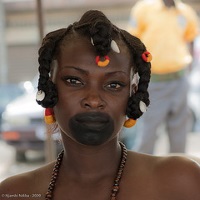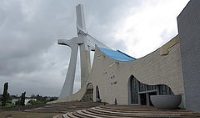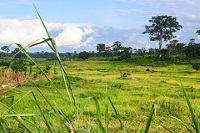Abidjan Travel Guide
Abidjan was once the proud and flourishing capital city of the Ivory Coast, and a jewel in the continent of Africa's crown; however, years of civil unrest and a lack of maintenance have seen the city slowly move away from the reputation it once held as the 'Paris of West Africa'. For those travelling to Ivory Coast, Abidjan will more than likely be their first introduction to the country.
The city is testament to what the country once was and what it could be again. This is evident in sites such as the Hotel Ivoire, which was constructed in the sixties at the edge of the Ebrie Lagoon. Visitors will relish how the hotel's contemporary architecture, furniture and decor blend French luxury with African charm. Some sites in the city include a popular beach area known as Grand Bassam, the public zoo, a rainforest park in the city called Park du Banco, and Saint Paul's Cathedral.
Otherwise, the destination isn't especially friendly, items aren't cheap and barely anyone speaks English. Still, visitors can expect things to move reasonably fast in this business-minded city, where they'll find designer brands, large supermarkets, fancy restaurants and other modern amenities.
Things to do in Abidjan
Abidjan is not known as a tourist Mecca, but there are a couple of interesting sites to visit while in the city. It is a spread out city made up of a handful of districts but a good place to start a tour (probably the only place) is Le Plateau. Starting at Laza De la Republique and heading into the Tourist Information centre in the Air Ivoire Building will give visitors a good idea of what can be seen in Abidjan. From there they can walk up Blvd De la Republique. Travellers will pass the flea market on the left-hand side of the road and will find places to eat, but they should definitely take some water along.
Visitors who stay on this road will make their way to the Cathedral St. Paul. This modern imposing Cathedral is certainly one of the major landmarks in Abidjan. Built in honour of the Pope in 1985, the architecture is meant to symbolise the form of Jesus, though with hints of elephant tusks, the symbol of Cote D'Ivoire. The National museum is a short walk from the Cathedral.

Treichville
Tourists looking for a little entertainment in Abidjan should head to the area of Treichville, a small commune located in the southwest of the city. Full of bars and restaurants, as well as a racecourse, swimming pool and sports park, this is the area in which visitors are most likely to run into other tourists or expats based in Abidjan. While visitors should check with their hotel on the safety situation before stepping out at night, Treichville is certainly the place to go if they want to sample some of the city's surprisingly vibrant nightlife. The market is worth a visit during the day, as it offers an array of interesting and affordable items.

Saint Paul's Cathedral
Designed by Italian architect Aldo Spirito and covering a massive 14,625 square feet (4,500m square), this cathedral is reputedly Africa's second-largest church building and can seat more than 3,500 people. Pope John Paul II inaugurated the cathedral in a beautiful opening ceremony in August 1985. The tower itself is said to be a figure of St Paul, while the buildings behind the tower represent his robes. The interior of the cathedral includes a number of beautiful stained-glass tableaux. The building also offers spectacular views of the city that tourists can enjoy.

Abokouamekro National Park
Located about an hour away from Yamoussoukro, the Parc National d'Abokouamekro (Abokouamekro National Park) is an up-and-coming Ivory Coast tourist attraction of great promise. Covering over 21,000 hectares of verdant grassland, criss-crossed by rivers and punctuated by towering trees, Abokouamekro National Park is also an important game reserve, offering refuge to the region's threatened wildlife. Visitors can gaze in wonder at the seemingly endless rolling green vistas, and be on the lookout for rhinos, giraffe, buffalo, hippos, monkeys and more.
Eating Out
There are a few good places for tourists to eat; from local cheap and cheerful spots with brochettes (kebabs) and beer, to Lebanese and French restaurants. Although leaving their hotel at night can be unsafe for tourists, Le Plateau is worth visiting if they do venture out for a late lunch or early dinner. The area has a small selection of restaurants.
Getting Around
Abidjan's public transport system can be difficult to navigate, as there are a number of different taxis operating in the city. Orange taxi cabs operate throughout the city and are the most expensive but also generally the safest option; taxis of other colours operate only in specific areas, are usually shared, and tend to be much cheaper. Taxis are rarely metered and a fare should be negotiated before getting into the vehicle. Motorcycle taxis also operate in Abidjan, and although cheap, they are best avoided due to safety concerns.
Buses operate along fixed routes in Abidjan, but are often overcrowded and plagued by petty theft, especially at bus stations. Ferries travel across the lagoon. Car hire is available at the airport, although self-drive is not recommended, as roads can be chaotic and difficult to navigate. Often the best option for visitors is to hire a vehicle with a driver. Mobile App taxi services such as TaxiJet (similar to Uber) are also an option for travellers looking for convenience and safety.
Abidjan Climate and Weather
Abidjan, like the rest of Ivory Coast, enjoys a tropical monsoon climate. Temperatures in this coastal city tend to remain in the region of 70F (21C) to 90F (32C) year-round. Abidjan experiences the majority of its rain during the monsoon months from May to July. October and November can be wet months but the average rainfall for the rest of the year remains minimal. Humidity is generally high, particularly from January to June, when temperatures tend to remain constant at about 86F (30C). The best time to visit is during the cooler and drier months between November and January.
Ivory Coast travel info
Electricity
Electrical current is 230 volts, 50Hz. Plug types in use are round pin attachment plugs or round pin plugs and receptacles with a male grounding pin.
Language
The official language of Ivory Coast is French but more than 60 native dialects are spoken.
Money
The official currency is the West African CFA franc (XOF), which is divided into 100 centimes and is linked to the euro at a fixed rate of exchange. Abidjan has many ATMs but they may not be reliable. Travellers should make sure they have enough cash for their trip, as ATMs are rare outside of the city. Credit cards are accepted in the larger hotels and more established restaurants.
Tipping
A service charge is usually added to hotel and restaurant bills, though a tip of 10 to 15 percent would be appreciated. Taxi drivers usually expect 10 percent.
Health
There is a risk of yellow fever transmission and yellow fever vaccination is required for entry. Vaccination is recommended for typhoid, hepatitis A and hepatitis B, and meningococcal vaccine is recommended for travel between November and June. Travellers should exercise normal precautions to avoid exposure to HIV/AIDS. Effective mosquito repellent is necessary, as visitors may be exposed to chikungunya, dengue fever and zika virus. All water should be sterilised before use, and milk, which is unpasteurised, should be boiled. Travellers should avoid dairy products and ensure meat is well cooked and eaten hot; fruit and vegetables should be cooked and peeled before consumption. Medical treatment in Abidjan is of reasonable standard, though private care is expensive and facilities outside the major towns are very limited. Medical insurance with provision for repatriation is essential.
Safety
The political situation in Ivory Coast is volatile and demonstrations can occur unexpectedly. Travellers should take care in public places and avoid crowds. Violent crime is on the increase, including armed break-ins, car jackings, muggings and hold-ups in restaurants. Evening rush hour on Abidjan's Charles de Gaulle Bridge is particularly dangerous. Visitors should be meticulous in respecting the numerous army and police roadblocks, as police and security forces can be excitable and undisciplined. Particular care should be taken in the north and west of the country, where there have been frequent clashes. Travellers should be aware of conmen and touts when arriving at Abidjan airport, and the bridges crossing the lagoon in Abidjan should be avoided by those on foot. Taxis, except for metered orange taxis in Abidjan, are risky and often not roadworthy. Buses are overcrowded and best avoided.
Local customs
It's prohibited to take photographs near sensitive sites such as military or government buildings, and possession, use or trafficking of illegal drugs is a serious offence that can lead to heavy fines and lengthy prison sentences. Religion strongly influences life in the country, so visitors should respect local religious customs at all times. Homosexuality is not illegal, but LGBT travellers should be discreet as there is no legal recognition for LGBT couples, there are no specific anti-discrimination laws protecting LGBT individuals, and attitudes in Ivory Coast may be less tolerant.
Doing business
Though business in the Ivory Coast is fairly formal and punctuality is a must, more casual cotton suits are acceptable attire on account of the heat. Business is often conducted in French, but translators are readily available; greeting and acknowledging each person present with a handshake is important. Business hours are usually from 7.30am to 12pm, and 2.30pm to 6pm on weekdays, and from 8am to 12pm on Saturdays.
Duty free
Travellers to the Ivory Coast do not need to pay customs duty on 200 cigarettes or 100 cigarillos or 25 cigars or 250g of tobacco; one bottle of wine and one of spirits; 500ml eau de toilette and 250ml of perfume. Currency should be declared.
Communications
The country code for Ivory Coast is +225. The outgoing code is 00 followed by the relevant country code (e.g. 0044 for the United Kingdom). Travellers can purchase local prepaid SIM cards for unlocked phones; WiFi is available in hotels and restaurants in Abidjan, but may be harder to find in rural parts of the country.
Passport & Visa
All foreign passengers to the Ivory Coast must hold proof of arranged accommodation, return or onward tickets, and the necessary travel documentation for their next destination. A yellow fever vaccination certificate is required to enter the Ivory Coast. Visitors will need to get an e-visa prior to arriving; the process is straightforward and is done completely online. It is highly recommended that travellers' passports have at least six months' validity remaining after the intended date of departure from their travel destination. Immigration officials often apply different rules to those stated by travel agents and official sources.
Entry requirements
US citizens must have a passport that is valid for at least six months beyond the period of intended stay, and require a visa to enter the Ivory Coast.
British citizens must have a passport that is valid for six months beyound the period of intended stay. A visa is required.
Canadian citizens must have a passport that is valid for at least six months beyond the period of intended stay, and require a visa to enter the Ivory Coast.
Australian citizens must have a passport that is valid for at least six months beyond the period of intended stay, and require a visa to enter the Ivory Coast.
South African citizens must have a passport that is valid for at least six months beyond the period of intended stay, and require a visa to enter the Ivory Coast.
Irish citizens must have a passport that is valid for at least six months beyond the period of intended stay, and require a visa to enter the Ivory Coast.
New Zealand citizens must have a passport that is valid for at least six months beyond the period of intended stay, and require a visa to enter the Ivory Coast.
Useful contacts
+225 20 2587 88 (police and other emergencies)Embassies / consulates in other countries
Ivory Coast Embassy, Washington DC, United States: +1 202 797 0300.
Ivory Coast Embassy, London, United Kingdom: +44 20 7201 9601 and +44 20 7235 6991.
Ivory Coast Embassy, Ottawa, Canada: +1 (613) 236 9919.
Ivory Coast Embassy, Pretoria, South Africa: +27 12 342 6913/4.
Embassies / consulates in Ivory Coast
United States Embassy, Abidjan: +225 2249 4000 and +225 2249 4594.
British Embassy, Abidjan: +225 2244 2669.
Canadian Embassy, Abidjan (also responsible for Australia): +225 2030 0700.
South African Embassy, Abidjan: +225 2244 5963 and +225 2244 7534.



